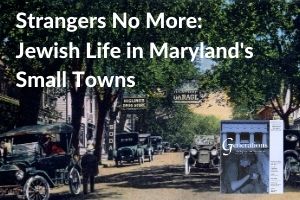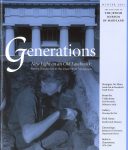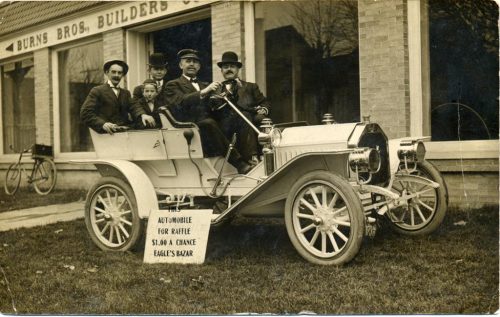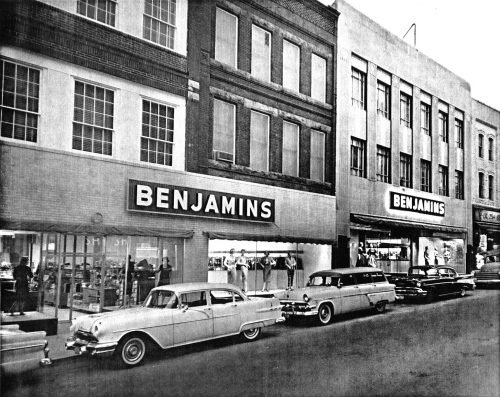Putting Down Roots

 Part 3 of “Strangers No More: Jewish Life in Maryland’s Small Towns. Missed the beginning? Head there now! Written by Karen Falk, former JMM curator. Originally published in Generations – Winter 2001. If you would like to purchase a hard copy of this issue, please contact our shop, Esther’s Place, at 443-873-5179 or email info@jewishmuseummd.org.
Part 3 of “Strangers No More: Jewish Life in Maryland’s Small Towns. Missed the beginning? Head there now! Written by Karen Falk, former JMM curator. Originally published in Generations – Winter 2001. If you would like to purchase a hard copy of this issue, please contact our shop, Esther’s Place, at 443-873-5179 or email info@jewishmuseummd.org.
Both the Central European Jews of the earlier migration and the Eastern European Jews of the later migration followed similar occupational patterns in small towns. Overwhelmingly, men became owners of their own business, although small numbers worked as artisans, farmers and cattle dealers, manufacturers, and professionals. The 1920 census indicates that almost 70% of Jews in Maryland’s small towns were occupied in some kind of mercantile pursuit.[1]
Jewish Comment correspondent, H.N. Werntz of Brunswick observed in 1917 that previously Jewish residents of small towns had resolved to remain there only temporarily, to earn and save enough money to enable a return to a more comfortable lifestyle in the city. He decries their resultant “…fail[ure] to take an interest in the welfare of the town.” In fact, however, there is early evidence of Jewish involvement in civic affairs, beginning with Levi Cohan’s assistance in lotteries which raised money to purchase a fire engine for Fredericktown in 1760 and 1768.[2] In 1898, Isaac Hirsch was President of the city council of Cumberland, and in 1909 Isaac Hecht helped raffle an automobile for an Eagles bazaar.

As business people, Jews wanted what was best for their town. They were vitally interested that the town provide improvements, create a good business climate, and attract new residents. As a result, they often sought leadership roles that would help them to ensure these outcomes. That they were frequently elected to such positions is a testament to the remarkable acceptance they had achieved among their Gentile neighbors. Natalie Fox Jeffery described her father’s experience:
It was a big deal that my father was asked to join the Rotary Club because only one business of each type could join – one pharmacist, etc. Then one of his friends talked him into running for the Board of Town Commissioners. The top three [vote getters among those running for Town Commissioner then] voted for the President of the Town Commissioners and he was elected in 1950.
When Herman Fox and his wife retired to Baltimore in 1968, the Princess Anne Area Chamber of Commerce held a going away party “in recognition of the more than thirty years they served the community at their variety store.”

There is evidence that the achievement of elected office by Jews was somewhat easier in the small towns, such as Princess Anne, than in the larger communities. In those places, Jews became involved in civic affairs that relied on volunteering and appointments. I.L. Benjamin’s civic involvement was typical. Benjamin arrived in Salisbury in 1915 and established a clothing store that grew into a prominent department store. In addition to raising his family and building his business into one that presided over the main shopping street in Salisbury, he spent fifty years serving his community in every imaginable way. When General Amos W.W. Woodcock presented him with the Salisbury Award in 1958, he described Benjamin as a man of unassailable integrity, who “came as a stranger, [but] made a place for himself in the affection and respect [of his fellow man].” Among Benjamin’s many activities were a charter membership in the Salisbury Rotary Club and presidency of the Chamber of Commerce. He was voted a member of such fraternal organizations as the Masons and Elks, and was a prominent contributor to the Community Fund, the Salvation Army, and the Red Cross. Benjamin was also chosen chairman of the board of Peninsula General Hospital. His largesse extended to the growing Jewish community of Salisbury, as a founder of Salisbury’s Beth Israel Congregation in 1925 and leader of the synagogue’s building campaign in 1950. Mr. Benjamin’s example is mirrored across the state in the achievements of Jewish men and women of more recent decades.
Continue to Part 4: Making Jewish Community, publishing February 11, 2019.
[1] Sherman E. Silverman, East European Jews in Maryland Towns Using the 1920 Federal Manuscript Census, unpublished manuscript, n.d., Jewish Museum of Maryland vertical files.
[2] Eric L. Goldstein, Traders and Transports: The Jews of Colonial Maryland, Jewish Historical Society of Maryland, 1993.
